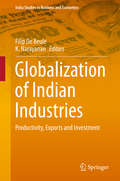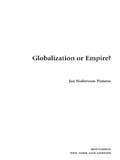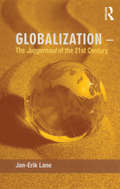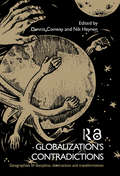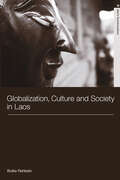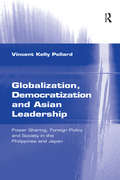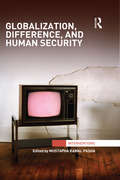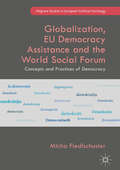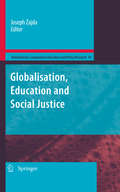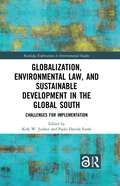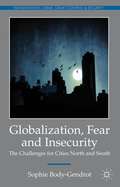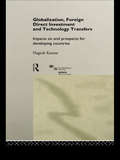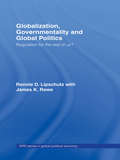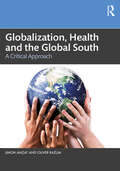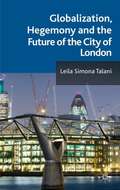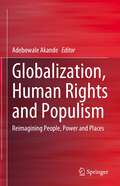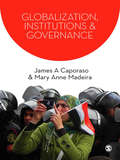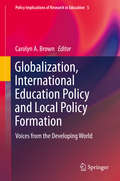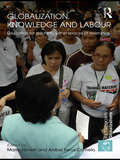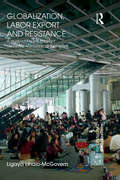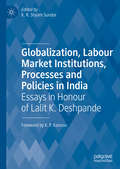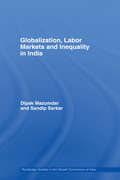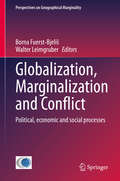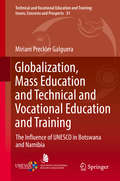- Table View
- List View
Globalization of Indian Industries
by Filip De Beule K. NarayananThis book focuses on Indianmanufacturing industries and analyses the impact of inward foreign directinvestment on the domestic sector on the one hand, and exports and outwardforeign direct investment by Indian companies on the other. Although theemphasis is mostly general, specific industries, such as the automotiveindustry or the wind energy sector are also explored. The differences between lowand high technology industries are also addressed. In terms of theoretical settingand analysis, the book draws both from international business and industrial organizationliterature. The various characteristics of Indian industries, such as thedeterminants and impacts of R&D, the effects of spillovers, the drivers ofproductivity and technical efficiency are thoroughly researched employingappropriate quantitative methodologies that are relevant to the specific domainand topic under investigation. The book also focuses on the bearing ofpolicy on promoting manufacturing industries in India and is therefore ofinterest to researchers, industrialists and policy makers alike.
Globalization or Empire?
by Jan Nederveen PieterseIn this smart and concise examination of the trends driving contemporary globalization, Jan Nederveen Pieterse argues that the United States' pursuit of global primacy is based upon a complex melding of neoliberal economics and hegemonic politics. Do alternate capitalisms offer viable alternatives to the American way? Globalization or Empire? looks at globalization with acuity and thoughtfulness and uncovers its underlying dramas.
Globalization – The Juggernaut of the 21st Century: The Juggernaut Of The 21st Century
by Jan-Erik LaneWhile some people debate whether globalization really exists, it proceeds apace, affecting all societies. It presents us with unknown challenges and, as governments start to discuss what to do about these challenges, it is becoming obvious that globalization is not manageable. With globalization the juggernaut of the 21st century, all countries of the world become interdependent in relation to the coming energy crisis, climate change, the sharper cleavages between rich and poor countries and people, and the emergence of a multicultural social structure. This interesting and erudite book adopts a distinctive approach to the multiple dimensions of the globalization debate. The impressive coverage of philosophical thought - including Popper, Weber, Habermas, Lipset and Hobbes - makes a valuable contribution to the debates on globalization.
Globalization's Contradictions: Geographies of Discipline, Destruction and Transformation
by Nik Heynen Dennis ConwaySince the 1980s, globalization and neoliberalism have brought about a comprehensive restructuring of everyone’s lives. People are being ‘disciplined’ by neoliberal economic agendas, ‘transformed’ by communication and information technology changes, global commodity chains and networks, and in the Global South in particular, destroyed livelihoods, debilitating impoverishment, disease pandemics, among other disastrous disruptions, are also globalization’s legacy. This collection of geographical treatments of such a complex set of processes unearths the contradictions in the impacts of globalization on peoples’ lives. Globalizations Contradictions firstly introduces globalization in all its intricacy and contrariness, followed on by substantive coverage of globalization’s dimensions. Other areas that are covered in depth are: globalization’s macro-economic faces globalization’s unruly spaces globalization’s geo-political faces ecological globalization globalization’s cultural challenges globalization from below fair globalization. Globalizations Contradictions is a critical examination of the continuing role of international and supra-national institutions and their involvement in the political economic management and determination of global restructuring. Deliberately, this collection raises questions, even as it offers geographical insights and thoughtful assessments of globalization’s multifaceted ‘faces and spaces.’
Globalization, Agriculture and Food in the Caribbean
by Clinton L. Beckford Kevon RhineyThe last decade has seen a growing body of research about globalization and climate change in the Caribbean. This collection is a significant addition to the literature on a topic that is of critical importance to the region. It explores research from a number of Caribbean islands dealing with a range of issues related to agriculture and food in the context of globalization and climate change. Using a broad livelihoods perspective, the impacts on rural livelihoods are explored as well as issues related to community level resilience, adaptability and adaptations. The volume is strengthened by gendered analyses of issues and discussions informed by a diverse range of research methods and methodologies. Scholars of Caribbean studies and studies pertaining to social, cultural, economic and environmental issues facing Small Island Developing States (SIDS) will greatly benefit from this book.
Globalization, Culture and Society in Laos (Routledge Studies in Asia's Transformations)
by Boike RehbeinIncorporating original fieldwork carried out over a period of more than ten years, combined with innovative theoretical argument, Globalization, Culture and Society in Laos presents one of the first sociological investigations into modern Laos. Boike Rehbein gives a fascinating overview of contemporary Lao culture and society, whilst linking local and national phenomena to tendencies of globalization and the history of the region. The book introduces a new theoretical approach based on the sociology of Pierre Bourdieu, applying this sociology to the interpretation of Lao history. It also examines various aspects of Lao culture and society, including economics, politics, language, higher education, music, and religion. Rehbein concludes by attempting to synthesize these cultural elements with the impact of globalization to give a synopsis of contemporary Lao society. Written by an expert in Lao history and culture, familiar with the language and the people, this book will be of huge interest to students and scholars of Laos, Southeast Asia, social theory and globalization.
Globalization, Democratization and Asian Leadership: Power Sharing, Foreign Policy and Society in the Philippines and Japan
by Vincent Kelly PollardThe foreign policies of presidents, prime ministers and their foreign secretaries can be influenced by the preferences of domestic and international nongovernmental actors, as well as those of other governments. Representative democracy, media power, citizen activism and the globalization of politics and telecommunications, for example, have accelerated changes in the sharing of power. This book focuses on the Philippines and Japan where, willingly and unwillingly, foreign policy executives share power with individuals and groups inside and outside of government bureaucracies and their societies. The book retells the foreign policy narratives of regional cooperation, military relations and official development assistance (foreign aid), revealing how executive foreign policy makers and civil society organizations share power - and succeed or fail - in a globalizing, democratizing world. A variety of published, unpublished and declassified sources provide journalists, scholars, government practitioners and global citizens with a sophisticated understanding of the domestic politics of foreign policy making, as well as its intergovernmental and transnational side.
Globalization, Difference, and Human Security: Globalization, Difference, And Human Security (Interventions)
by Mustapha Kamal PashaGlobalization, Difference, and Human Security seeks to advance critical human security studies by re-framing the concept of human security in terms of the thematic of difference. Drawing together a wide range of contributors, the volume is framed, among others, around the following key questions: What are the silences and erasures of advancing a critical human security alternative without making recognition of difference its central plank?How do we rethink the complex interplay of human security and difference in distinct and varied spatial and cultural settings produced by global forces? What is the nexus between human security and the broader field of global development? What new challenges to Human Security and International Relations are produced with the rise of the ‘post-liberal’ or ‘post-secular’ subject? In what ways releasing human security from identification with the territorial state helps reconceptualize culture? How does Human Security serve as a subspecies of modern humanitarian thought or the latter reinforce imperial imaginaries and the structures of order and morality? Is the pursuit of indigenous rights fundamentally counterpoised to the pursuit of human security? What difference it might make to take the ‘doings and beings’ of communities-of-subsistence rather than basic-needs/wealth-seeking individuals as a point of departure in critical human security studies? How does reconstruction bind post-war and post-disaster states and societies into the global capitalist-democratic political structure?
Globalization, EU Democracy Assistance and the World Social Forum: Concepts and Practices of Democracy (Palgrave Studies in European Political Sociology)
by Micha FiedlschusterSeeking to extend the debate on the diversity of democracy, this book provides the reader with a comprehensive account of how two different global actors, the European Union and the World Social Forum respond to the challenges of globalization with various models of democracy and modes of cooperation at the transnational level.Analysing EU democracy assistance in the EU’s neighbourhood, Fiedlschuster sheds light on the complex relationship between the EU and civil society. Although the EU perceives a vital civil society as crucial for democracy, its mix of a governance approach with deliberative and participatory democracy will unlikely result in a citizen-centred democracy. The book also provides a compelling account of the World Social Forum and its participants interviewed for this work attempt to answer one of the challenges of contemporary globalization: How can civil society pursue democratically global social change? Fiedlschuster skilfully deploys various sociological approaches not only to analyse concepts and practices of democracy by transnational activists but also to throw light on the tensions between democratic idealism and anti-democratic tendencies in the Forum. This book will be of wide interest to students and academics, including those working within political sociology, European Union politics, and globalization.
Globalization, Education and Social Justice
by Joseph ZajdaGlobalization, Education and Social Justice, which is the tenth volume in the 12-volume book series Globalisation, Comparative Education and Policy Research, presents up-to-date scholarly research on major discourses concerning global trends in education, social justice and policy research. It provides an easily accessible, practical yet scholarly source of information about the international concern in the field of social justice, globalisation, and policy research. Above all, the book offers the latest findings to the critical issues in education and social justice globally. It is a sourcebook of ideas for researchers, practitioners and policy makers in education, globalisation and social justice education reforms around the world. It offers a timely overview of current issues in social justice affecting education policy research in the global culture. It provides directions in education, and policy research, relevant to transformational educational reforms in the 21st century. The book critically examines the overall interplay between globalisation, education reforms, and social justice. It draws upon recent studies in the areas of globalisation, social justice education reforms and the role of the State. It explores conceptual frameworks and methodological approaches applicable in the research covering the State, globalisation, equity, education, and social justice. It demonstrates the neo-liberal ideological imperatives of education and policy reforms, and illustrates the way the relationship between the State and education policy affects current models and trends in education reforms for social justice and schooling globally. Various book chapters critique the dominant discourses and debates pertaining to the politics of social justice and education globally and the newly constructed and re-invented models of neo-liberal ideology in education and policy reforms. Using a number of diverse paradigms in comparative education research, ranging from critical theory to post-structuralist discourses, the authors, by focusing on globalisation, social justice and democracy, attempt to examine critically both the reasons and outcomes of education reforms and policy change for social justice. The volume offers a more informed critique on the Western-driven models of education reforms and implications for social justice. The book also draws upon recent studies in the areas of equity, cultural capital and dominant ideologies in education. The general intention is to make Globalization, Education and Social Justice available to a broad spectrum of users among policy-makers, academics, graduate students, education policy researchers, administrators, and practitioners in the education and related professions.
Globalization, Environmental Law, and Sustainable Development in the Global South: Challenges for Implementation (Routledge Explorations in Environmental Studies)
by Kirk W. JunkerThis volume examines the impact of globalization on international environmental law and the implementation of sustainable development in the Global South. Comprising contributions from lawyers from the Global South or who have experience in the Global South, this volume is organized into three parts, with a thematic inquiry woven through every chapter to ask how law can enable economies that can be sustained, given the limited carrying capacity of the earth. Part I describes and characterizes the status quo of environmental and economic problems in the Global South during the process of globalization. Some of those problems include redistribution of environmental burden on the public through over-reliance on the state in emerging economies and the transition to public-private partnerships, as well as extreme uncontrolled economic expansion. Building on Part I, Part II takes an international perspective by presenting some tools that are in place during the process of globalization that lead to friction and interfaces between developed and developing economies in environmental law. Recognizing the impossibility of a globalized Northern economy, the authors in Part III present some alternatives through framework ideas of human and civil rights, environmental rights, and indigenous persons’ rights, as well as concrete and specific legal tools to strengthen justice and rule of law institutions. The book gives new perspectives to familiar approaches through concrete examples by professional practitioners and theoretical discourse by academic researchers, and can thereby form the basis for changes in practices, as well as further discussions and comparisons. This book will be of great interest to students and scholars of environmental law, sustainable development, and globalization and international relations, as well as legal professionals and practitioners.
Globalization, Fear and Insecurity
by Sophie Body-GendrotFear is ingrained in the history of cities but our short-sightedness prevents us from grasping its evolution over time. Increasingly, risk and fear are experienced, portrayed and discussed as globalized phenomena, particularly since 9/11. This research puts urban insecurity in perspective, with a comparison of world cities in the North and South.
Globalization, Foreign Direct Investment and Technology Transfers: Impacts on and Prospects for Developing Countries (UNU/INTECH Studies in New Technology and Development #No.7)
by Nagesh KumarIn this book, Nagesh Kumar and expert contributors examine and explain the emerging patterns in international technology transfers and foreign direct investment flows (FDIs) over the past two decades. They analyse the trends in internationalization of corporate activity in individual source countries, discussing outflows from both major and emerging source countries. This departs from the existing treatments of FDI as homogenous resource and allows for a more detailed prediction of future outflow patterns. Throughout, the research focuses upon the implications of new trends for developing countries. Kumar concludes by outlining the policy implications for the governments of such countries seeking to mobilize technology and FDI for their industrialization and further integration into the international community. Controversially, he cautions against excessive optimism about the potential of FDI inflows as an agent of development. This book draws together much data and information which is not readily available and provides reflections upon international business negotiations from a developing country's perspective.
Globalization, Governmentality and Global Politics: Regulation for the Rest of Us? (RIPE Series in Global Political Economy)
by Ronnie Lipschutz James K. RoweGlobalization is moving fast, impacting on the life of all nations with accelerating force. In this new study Ronnie Lipschutz shows how it is being handled by specific groups seeking positive outcomes for the people and causes they represent. Globalization, Governmentality and Global Politics details how the widespread failure of states and corporations to regulate the impact of increased globalization has given rise to non-governmental organizations and movements, aiming to influence corporations regarding social responsibilities and address key issues such as human rights, environmental destruction, unhealthy working conditions and child labour. Assessing the effectiveness of these efforts, it examines both the new movements and the issues they are tackling. With three key case studies on the clothing industry, sustainable forestry and corporate social responsibility, it explores the tensions between politics and management, examining the theoretical implications of regulation for politics, citizenship and the state. Finally, it takes a fresh look at what is to be done, calling for a return to politics centred on the direct participation of the individual in the social choices that affect quality of life, working conditions and the global future.
Globalization, Health and the Global South: A Critical Approach
by Jimoh Amzat Oliver RazumGlobalization is a form of social change, reshaping the socio-spatial milieu in which humans strive, and in which health and disease are managed and controlled. And yet the effects of globalization are distributed unevenly, with opportunities open for some but not for all. Globalization, Health and the Global South is an important textbook for any student of this fascinating area. Examining the dynamics of globalization through the lens of the Global South, it highlights risks and vulnerabilities that affect different regions and contexts, exacerbating inequalities despite the continuing speed of global processes. The books takes a critical approach to the topic, offering readers a deep understanding of health discourses and discusses a range of key topics, including migrant health, the role of politics and diplomacy and the Coronavirus pandemic. Including further reading and end of chapter discussion questions, this essential textbook will be important reading for students across the health and social sciences.
Globalization, Hegemony and the Future of the City of London
by Leila Simona TalaniThis book gives a detailed account of the primacy of the City of London, both as a domestic actor and as a global financial centre. It focuses on whether the hegemonic position of the City of London can be threatened by the globalization process and how this relates to its role as an international money laundering centre.
Globalization, Human Rights and Populism: Reimagining People, Power and Places
by Adebowale AkandeThis book offers a comprehensive and multidisciplinary global overview of populism and human rights in the light of globalization. It examines why the dominant (neo)liberal paradigm of the last decades resulted in major economic and social inequalities which resulted in the surge of national populism, led by the election success of right-wing parties, movements, and leaders across the world. It discusses, among other topics, the success of Brexit in Britain and the election success of Donald Trump and Marine Le Pen and explains why there is a need for a dialogue on human rights and globalization in this era of populism.Further contributions analyze various important topics of the field, including cross-culturalism, globalization, human rights, challenges and threats, diversity, curbing global corruption, sustainable development, populism, the decline of free speech, the new nationalism, internationalization, global regime of human rights, leadership theory, global management competencies, gender, quality management, individualism-collectivism, and examples of new initiatives in global organizations. This makes the book a valuable and useful resource for students, researchers, and scholars of international relations, political science, sociology, political psychology, law, diplomatic studies, Communication and media studies, economics, education and management, as well as practitioners and policy-makers interested in a better understanding of globalization, populism, and human rights.
Globalization, Institutions and Governance (SAGE Series on the Foundations of International Re)
by James A. Caporaso Mary Anne MadeiraThe study of international relations now goes well beyond state-to-state politics and even regional politics. Technological forces are working their effects on the world as a whole, bringing state and non-state actors into contact with one another. Globalization, Institutions and Governance provides students with a sophisticated and engaging exploration of the often differing impacts of these technological forces and the wider implications of globalization for theories of global governance and the role of international institutions. This title is part of the SAGE Series on the Foundations of International Relations. This series fills the gap between narrowly-focused research monographs and broad introductory texts, providing graduate students with state-of-the-art, critical overviews of the key sub-fields within International Relations: International Political Economy, International Security, Foreign Policy Analysis, International Organization, Normative IR Theory, International Environmental Politics, Globalization, and IR Theory. Explicitly designed to further the transatlantic dialogue fostered by publications such as the SAGE Handbook of International Relations, the series is written by renowned scholars drawn from North America, continental Europe and the UK. The books are intended as core texts on advanced courses in IR, taking students beyond the basics and into the heart of the debates within each field, encouraging an independent, critical approach and signposting further avenues of research. Series Editors: Walter Carlsnaes Uppsala University, Sweden Jeffrey T. Checkel Simon Fraser University, Canada International Advisory Board: Peter J. Katzenstein Cornell University, USA; Emanuel Adler University of Toronto, Canada; Martha Finnemore George Washington University, USA; Andrew Hurrell Oxford University, UK; G. John Ikenberry Princeton University, USA; Beth Simmons Harvard University, USA; Steve Smith University of Exeter, UK; Michael Zuern Hertie School of Governance, Berlin, Germany.
Globalization, International Education Policy and Local Policy Formation
by Carolyn A. BrownThis edited volume focuses on how international education policy, set by international policymakers and donors, influences local education policy in developing countries. The book's primary purpose is to give voice to scholars from developing countries and regions around the world by inviting them to explore how the international policy, invariably linked to international aid, influences education policy formation and implementation in their country or region and how this influence does or does not meet the local cultural, social, economic, and political needs. A relatively recent and small body of research and commentary supports a discourse that questions how well international education policy mandates such as Education For All serve the needs of developing countries. The intent of this book is to advance this discourse by giving voice to local scholars who observe and study the donor process. The book will be divided into two sections: the first section will set the stage for the discussions in the second section by providing theoretical and historical context for international education policy. As a framework for understanding, the book adopts the position that international policy does not have either the ability or the intent to serve the widely diverse needs of development around the world. International education policy has been formed, historically, by wealthy nations and agencies dominated by Western theoretical paradigms. In recent years, donor countries have made an effort to collaborate with developing countries in developing international education policy goals; however, this collaboration has been limited. Following establishment of the context of international education policy, section II of the book provides a forum for scholars from around the world to openly discuss and critique the impact of international policy on education in their country or region.
Globalization, Knowledge and Labour: Education for Solidarity within Spaces of Resistance (Rethinking Globalizations)
by Mario NovelliThis book begins from the central premise that progressive social change requires collective struggle underpinned by a clear strategy, and that processes of neoliberal globalisation have altered the cartography upon which social struggle takes place. Drawing on insights from the knowledge production processes of labour movements around the world, this research seeks to highlight the central importance of knowledge production and processes of learning within social movements. Providing both a comprehensive theoretical and empirical introduction to the relationship between globalisation, knowledge and social movement strategy, the authors contend that the production and dissemination of alternative knowledge is central to a resurgence of working-class power. By presenting a wide range of case-studies, the book highlights the centrality of knowledge production and circulation processes to the potential expansion and revitalization of the role of civil society in the promotion of social democracy. The chapter contributors include activist-scholars, whose work represents a broad perspective on ‘labour’ including the unemployed, the self-employed at the margins of the labour market, the unorganized, and those who work in the informal economy. Delivering work which is at once theoretically rich and yet empirically informed, this work will be of interest to students and scholars from a range of disciplines including International Relations, Development Studies, Critical Labour and Social Movement Studies, and Education. It will also be of relevance to activists and practitioners engaged in strategy development and education in various social movements.
Globalization, Labor Export and Resistance: A Study of Filipino Migrant Domestic Workers in Global Cities (Rethinking Globalizations)
by Ligaya Lindio-McGovernMoving beyond polemical debates on globalization, this study considers complex intersections of gender, race, ethnicity, nationality and class within the field of globalized labor. As a significant contribution to the on-going debate on the role of neoliberal states in reproducing gender-race-class inequality in the global political economy, the volume examines the aggressive implementation of neoliberal policies of globalization in the Philippines, and how labor export has become a contradictory feature of the country's international political economy while being contested from below. Lindio-McGovern presents theoretical and ethnographic insights from observational and interview data gathered during fieldwork in various global cities—Hong Kong, Taipei, Rome, Vancouver, Chicago and Metro-Manila. The result is a compelling weave of theory and experience of exploitation and resistance, an important development in discourses and literature on globalization and social movements seeking to influence regimes that exploit migrant women as cheap labor to sustain gendered global capitalism. Globalization, Labor Export and Resistance: A Study of Filipino Migrant Domestic Workers in Global Cities, is an invaluable resource for scholars, researchers, policy makers, non-governmental organizations, community organizers, students of globalization, trade and labor politics. It will be useful in the fields of women/gender studies, labor studies, transnational social movements, political economy, development, international migration, international studies, international fieldwork and qualitative/feminist research.
Globalization, Labour Market Institutions, Processes and Policies in India: Essays in Honour of Lalit K. Deshpande
by K.R. Shyam SundarThis book explores the effects of product market and labour market reforms on firms, labour institutions and labour rights in the economic and industrial relations system in India. India has over the years liberalized its economy through a broad range of reforms concerning the product market and complementing these it has also sought to reform the labour market and the industrial relations system. The book assesses the impact of these reforms on both the formal and informal labour markets in India, critically examines the labour processes and uncovers/describes precarious conditions of labour in various industries and occupations, and analyzes the dynamics involved in the making of industrial, employment and labour policies in contemporary India.
Globalization, Labour Markets and Inequality in India (Routledge Studies In The Growth Economies Of Asia Ser.)
by Dipak Mazumdar Sandip SarkarIndia started on a program of reforms, both in its external and internal aspects, sometime in the mid-eighties and going on into the nineties. While the increased exposure to world markets (‘globalization’) and relaxation of domestic controls has undoubtedly given a spurt to the GDP growth rate, its impact on poverty, inequality and employment have been controversial. This book examines in detail these aspects of post-reform India and discerns the changes and trends which these new developments have created. Providing an original analysis of unit-level data available from the quinquennial National Sample Surveys, the Annual Surveys of Industries and other basic data sources, the authors analyse and compare the results with other pieces of work in the literature. As well as describing the overall situation for India, the book highlights regional differences, and looks at the major industrial sectors such as agriculture, manufacturing and tertiary services. The important topic of labor market institutions - both for the formal or organized and the unorganized sectors - is considered and the possible adverse effect on employment growth of the regulatory labor framework is examined carefully. Since any reform of this framework must go hand in hand with better state intervention in the informal sector to have any chance of acceptance politically, some of the major initiatives in this area are critically explored. Overall, this book will be of great interest to development economists, labour economists and specialists in South Asian Studies.
Globalization, Marginalization and Conflict: Political, economic and social processes (Perspectives on Geographical Marginality #6)
by Walter Leimgruber Borna Fuerst-BjelišThis book looks at marginality from a less conventional perspective by analyzing complex social, cultural, political and economic relations between the aspects of globalization and various forms of marginalization. It focuses specifically on the conflict potential that results from the globalization-driven inequality and marginalization of many segments of societies. This view is further illustrated in sections on border regions, identity issues, minorities and poverty. The book gives a comprehensive but in-depth analysis of the various aspects of the relations between globalization, marginalization and conflict issues, based on a number of case studies and regions worldwide. It shows how the same issues of globalization and marginalization manifest themselves in different ways under different circumstance, obviously requiring different solutions. Based on original research, this book provides new insights on the globalization-marginalization relations and a good resource to academics, scientists and students in various fields of social, political science and humanities.
Globalization, Mass Education and Technical and Vocational Education and Training: The Influence of UNESCO in Botswana and Namibia (Technical and Vocational Education and Training: Issues, Concerns and Prospects #31)
by Miriam Preckler GalgueraThis book assesses the influence of the international organization UNESCO on the development of national Technical and Vocational Education and Training (TVET) systems in the Southern African Community Region (SADC), focusing particularly on Botswana and Namibia. Designed around UNESCO’s Better Education for Africa’s Rise (BEAR) project, the study is an excellent example of applied policy research.Analysis is from the perspective of key stakeholders including UNESCO headquarters and field offices, Ministries of Education and of Labor, employers and employees, education and training institutions, international partners and more. Both qualitative and quantitative evidence are used to provide a comparative overview, and the author also reveals the current state of data on skills.Readers will discover common goals and challenges across the nations but also a common lack of action to measure the impact and influence that UNESCO’s programs have had at a national level, prior to this study. Were the newly implemented educational policies successful or not? If the public policies failed, why was that? These chapters shed light on such questions and how UNESCO's contribution influenced the national development processes, in the context of globalization processes and trends of global mass education.The book has much to offer for both scholars and those working in UN agencies or national governments who seek to develop education systems and better link them to the world of work.
